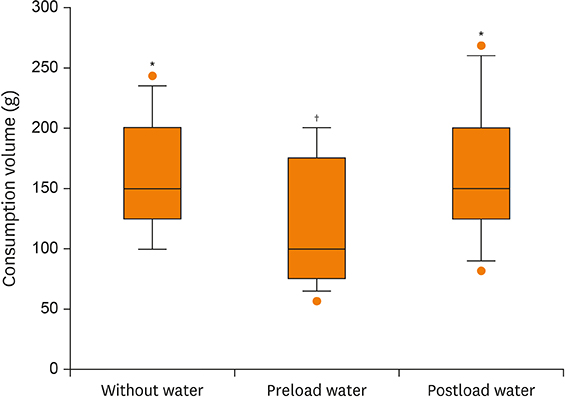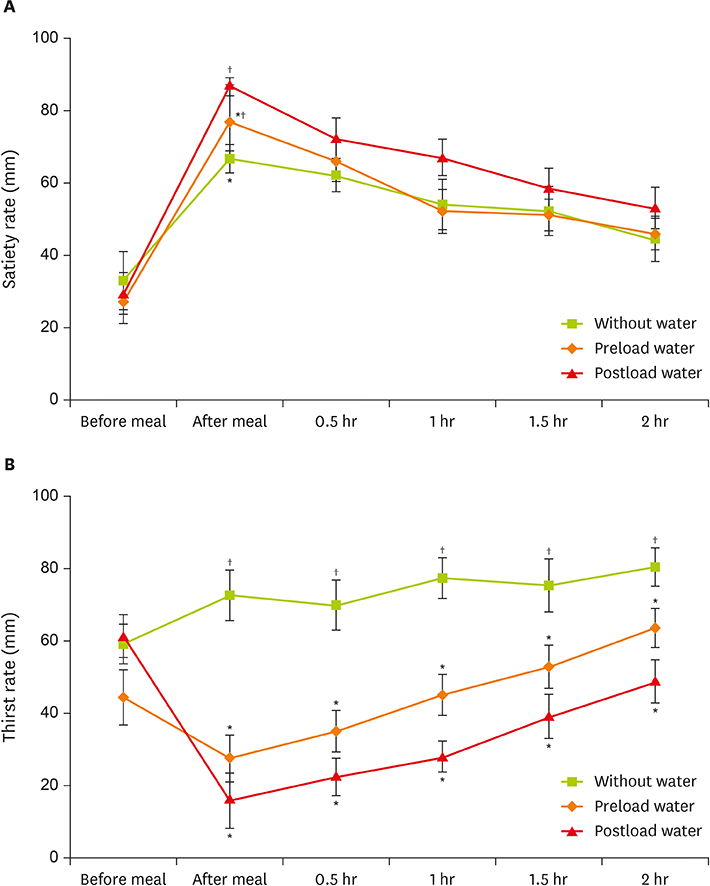Clin Nutr Res.
2018 Oct;7(4):291-296. 10.7762/cnr.2018.7.4.291.
Effect of Pre-meal Water Consumption on Energy Intake and Satiety in Non-obese Young Adults
- Affiliations
-
- 1Department of of Health Management, Jeonju University, Jeonju 55069, Korea. naji2004@jj.ac.kr
- KMID: 2424304
- DOI: http://doi.org/10.7762/cnr.2018.7.4.291
Abstract
- I determined whether water consumption reduces energy intake and affects satiety in non-obese young adults. The final subjects consisted of 15 individuals (8 women and 7 men) with average ages of 26.4 and 23.5 years for women and men, respectively. When subjects drank water before eating a test meal, they ate a lower amount of the test meal compared to eating test meals under waterless and postload water conditions (preload water: 123.3 g vs. waterless: 161.7 g or postload water: 163.3 g, p < 0.05). Water consumption after eating a test meal did not affect energy intake. When the subjects drank water before eating a test meal, despite consuming a lower amount, the subjects did not feel significantly less satiety than eating meals under waterless or postload water conditions. The finding that pre-meal water consumption led to a significant reduction in meal energy intake in young adults suggests that pre-meal water consumption may be an effective weight control strategy, although the mechanism of action is unknown.
Keyword
MeSH Terms
Figure
Reference
-
1. Strissel KJ, Stancheva Z, Miyoshi H, Perfield JW 2nd, DeFuria J, Jick Z, Greenberg AS, Obin MS. Adipocyte death, adipose tissue remodeling, and obesity complications. Diabetes. 2007; 56:2910–2918.
Article2. Lee MJ, Wu Y, Fried SK. Adipose tissue heterogeneity: implication of depot differences in adipose tissue for obesity complications. Mol Aspects Med. 2013; 34:1–11.
Article3. Ayyad C, Andersen T. Long-term efficacy of dietary treatment of obesity: a systematic review of studies published between 1931 and 1999. Obes Rev. 2000; 1:113–119.
Article4. Dennis EA, Dengo AL, Comber DL, Flack KD, Savla J, Davy KP, Davy BM. Water consumption increases weight loss during a hypocaloric diet intervention in middle-aged and older adults. Obesity (Silver Spring). 2010; 18:300–307.
Article5. DellaValle DM, Roe LS, Rolls BJ. Does the consumption of caloric and non-caloric beverages with a meal affect energy intake? Appetite. 2005; 44:187–193.
Article6. Lappalainen R, Mennen L, van Weert L, Mykkänen H. Drinking water with a meal: a simple method of coping with feelings of hunger, satiety and desire to eat. Eur J Clin Nutr. 1993; 47:815–819.7. Popkin BM, Barclay DV, Nielsen SJ. Water and food consumption patterns of U.S. adults from 1999 to 2001. Obes Res. 2005; 13:2146–2152.
Article8. Van Walleghen EL, Orr JS, Gentile CL, Davy BM. Pre-meal water consumption reduces meal energy intake in older but not younger subjects. Obesity (Silver Spring). 2007; 15:93–99.
Article9. Davy BM, Dennis EA, Dengo AL, Wilson KL, Davy KP. Water consumption reduces energy intake at a breakfast meal in obese older adults. J Am Diet Assoc. 2008; 108:1236–1239.
Article10. Rolls BJ, Dimeo KA, Shide DJ. Age-related impairments in the regulation of food intake. Am J Clin Nutr. 1995; 62:923–931.
Article11. Sturm K, Parker B, Wishart J, Feinle-Bisset C, Jones KL, Chapman I, Horowitz M. Energy intake and appetite are related to antral area in healthy young and older subjects. Am J Clin Nutr. 2004; 80:656–667.
Article12. Garner DM, Olmsted MP, Bohr Y, Garfinkel PE. The eating attitudes test: psychometric features and clinical correlates. Psychol Med. 1982; 12:871–878.
Article13. Knight RG, Waal-Manning HJ, Spears GF. Some norms and reliability data for the State--Trait Anxiety Inventory and the Zung Self-Rating Depression scale. Br J Clin Psychol. 1983; 22:245–249.
Article14. Rolls BJ, Bell EA, Castellanos VH, Chow M, Pelkman CL, Thorwart ML. Energy density but not fat content of foods affected energy intake in lean and obese women. Am J Clin Nutr. 1999; 69:863–871.
Article15. Rolls BJ, Roe LS, Meengs JS. Salad and satiety: energy density and portion size of a first-course salad affect energy intake at lunch. J Am Diet Assoc. 2004; 104:1570–1576.
Article16. Almiron-Roig E, Chen Y, Drewnowski A. Liquid calories and the failure of satiety: how good is the evidence? Obes Rev. 2003; 4:201–212.
Article17. Daniels MC, Popkin BM. Impact of water intake on energy intake and weight status: a systematic review. Nutr Rev. 2010; 68:505–521.
Article18. Parretti HM, Aveyard P, Blannin A, Clifford SJ, Coleman SJ, Roalfe A, Daley AJ. Efficacy of water preloading before main meals as a strategy for weight loss in primary care patients with obesity: RCT. Obesity (Silver Spring). 2015; 23:1785–1791.
Article19. Du H, van der A DL, Boshuizen HC, Forouhi NG, Wareham NJ, Halkjaer J, Tjønneland A, Overvad K, Jakobsen MU, Boeing H, Buijsse B, Masala G, Palli D, Sørensen TI, Saris WH, Feskens EJ. Dietary fiber and subsequent changes in body weight and waist circumference in European men and women. Am J Clin Nutr. 2010; 91:329–336.
Article20. Rolls BJ, Roe LS, Beach AM, Kris-Etherton PM. Provision of foods differing in energy density affects long-term weight loss. Obes Res. 2005; 13:1052–1060.
Article21. Lowe MR, Tappe KA, Annunziato RA, Riddell LJ, Coletta MC, Crerand CE, Didie ER, Ochner CN, McKinney S. The effect of training in reduced energy density eating and food self-monitoring accuracy on weight loss maintenance. Obesity (Silver Spring). 2008; 16:2016–2023.
Article22. Corney RA, Sunderland C, James LJ. Immediate pre-meal water ingestion decreases voluntary food intake in lean young males. Eur J Nutr. 2016; 55:815–819.
Article
- Full Text Links
- Actions
-
Cited
- CITED
-
- Close
- Share
- Similar articles
-
- Thermic Effect of Food, Macronutrient Oxidation Rate and Satiety of Medium-chain Triglyceride
- Thermic Effect of Food, Macronutrient Oxidation Rate and Satiety of High-fat Meals with Butter and Sesame Oil on Healthy Adults
- Short-Term Effect of Convenience Meal Intake on Glycemic Response and Satiety among Healthy College Students in South Korea
- Effects of Soup Temperature on Hunger, Energy and Nutrient Intake
- The Relationship between Food Intake, Sodium Intake and Satiety Rate and the Methods of Consuming Soup



